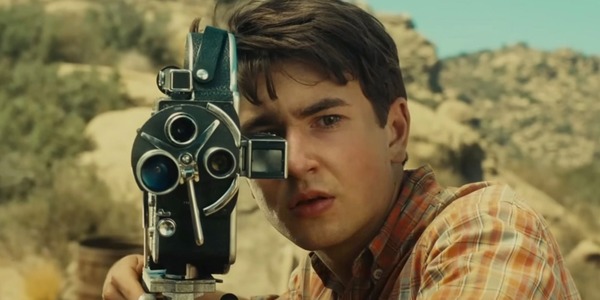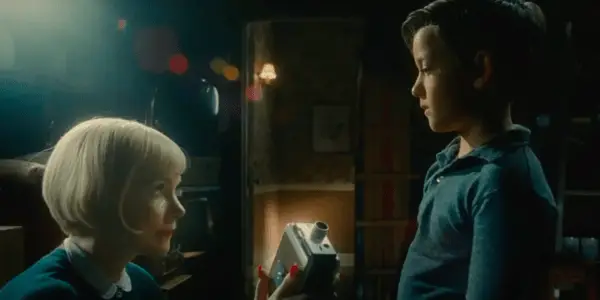Toronto International Film Festival 2022 THE FABELMANS: Cinema Can Make You And Break You
Soham Gadre is a writer/filmmaker in the Washington D.C. area.…
Steven Spielberg has been holding a mirror to his own cinema and career for at least half a decade now. If Ready Player One (2018) was the resounding self-reflective moment in Spielberg’s latter career arc focused on his legacy as a director, then The Fabelmans is Spielberg’s reflection of the legacy of his family on his craft. But reflecting on something so personal, so deeply rooted in an artist’s entire view of the world, is difficult and as such there was an awkward hesitancy in this movie. It’s one of the few times in Spielberg’s oeuvre where the relationship dynamics in marriage, children, school, and love interests aren’t paved over by monsters, aliens, and world-shaking historical events. He’s not a dramatist as much as he is a magician – a reason why Tony Kushner is such a valuable partner in the writing process for him – and likewise, he ends up tiptoeing in the film’s most raw moments.
Spielberg’s Influences and Mastery
The signatures of Spielberg’s legendary visual storytelling prowess find themselves in two very distinctly memorable sequences in The Fabelmans. The first, when a storm rages in the quaint suburban neighborhood of Spielberg’s childhood, is a direct reference to Close Encounters of the Third Kind (1977).

Sparks fly from electric poles, the storm has the feel of an alien invasion, and Spielberg’s matriarchal stand-in (played by a fitfully frustrating and erratic Michelle Williams) frantically corrals her kids into the family car to drive off, only to come to her senses at an intersection that looks like it’s being sucked up into space (Both Spielberg and David Lynch, who makes a cameo appearance in the film, have crossed American suburbia and its electrical grid with interdimensional travel to differing ends).
The second sequence, my favorite in the movie, is where Sammy Fabelman (Spielberg’s childhood stand-in played by Gabriel LaBelle) edits footage of a family camping trip and discovers that his mom is secretly cozying up to his dad’s best friend Benny (Seth Rogen). The mechanical editing apparatus and the Dede Allen-esque symbolic breakdown of shots through Sam’s eyes is a stunning metatextual demonstration of a filmmaker translating for his audience a formal approach to visual storytelling. Like Roger Ebert turned film criticism into an accessible written form for the masses, thus, often becoming a gateway teacher for people interested in cinema and its theory, Spielberg is nothing if not an entire American generation’s introduction to what filmmaking and storytelling are.
A Hesitant Approach
Aside from these hair-raising great moments, the rest of the movie seems to hold back both aesthetically and thematically and makes The Fabelmans less a demonstration of late-Spielberg mastery than say, West Side Story which came right before it and to my eyes is the true reminder of Spielberg’s influences.

Most of the movie plays out like a timeline-of-events family drama. Sammy’s parents have rifts wedged between them with his dad continuously moving for better jobs and more money, and Sammy’s distance from his parents increases as he gets embroiled in his own obsession, one which his uncle foretells “will break your heart”. As Sammy’s filmmaking grows more and more appreciation from family and neighborhood friends, his family life starts to become more and more strained pushing him further into his obsession.
Conclusion
Spielberg necessarily, for Hollywood purposes, always effused his movies with fantastical elements that relegated their human relationships to the subtext, a clear indication of his hesitancy to lay these things bare, if also a good way to market his cinema to the masses. Despite the lament that clearly exists – both in his disappointment with his mother’s infidelity and his dad’s career-oriented logic, Spielberg‘s sentimentality can’t help but make him stop short of lashing out at these things. Perhaps it’s a good thing, that finding some shimmering example of beauty and innate goodness in someone, some quality or trait to curtain over their flaws is natural instinct for Sammy Fabelman. It’s certainly helped make Spielberg’s movies as popular as they are.
The Fabelmans is releasing in U.S. theaters on November 11th, 2022!
Watch The Fabelmans
Does content like this matter to you?
Become a Member and support film journalism. Unlock access to all of Film Inquiry`s great articles. Join a community of like-minded readers who are passionate about cinema - get access to our private members Network, give back to independent filmmakers, and more.
Soham Gadre is a writer/filmmaker in the Washington D.C. area. He has written for Hyperallergic, MUBI Notebook, Popula, Vague Visages, and Bustle among others. He also works full-time for an environmental non-profit and is a screener for the Environmental Film Festival. Outside of film, he is a Chicago Bulls fan and frequenter of gastropubs.













